Containers
THE SHIPPING CONTAINER
his is the basic cargo transport unit (CTU) that is used to move the majority of the world’s shipped goods.
The container is a permanent transport receptacle, easy to load and unload, able to be reused repeatedly, and capable of protecting cargo as it is moved between different shipping modes or transport vehicles. This versatility has made intermodal shipping possible and has allowed for exponential expansion of international trade.
There are models of containers to cover every transport need, and all of these can be stacked. They are fitted with corner pieces and slots in their base that allow them to be lifted and manipulated horizontally and vertically, to be stacked, and to be firmly attached to their transport vehicle or to other containers.
The main sizes available are 45, 40, and 20 feet, and there are also high capacity types (high cube container or HC).
The measurement unit used for a container is the TEU (which stands for twenty-foot equivalent units), which is the equivalent of 6.10 meters. The overall capacities of ships or container terminals are measured using the TEU.
CONTAINERS FOR INTERMODAL SHIPPING
General Cargo Container
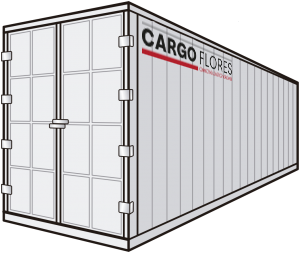 |
General cargo container | |||||||
| Internal dimensions | Capacity and useful load | Doors open | ||||||
| Length | Width | Height | Vol. | Max. load | Width | Height | ||
| 20′ST | 5.867 | 2.352 | 2.393 | 33,02 | 28.250 | 2.340 | 2.280 | |
| 20’HC | 5.867 | 2.352 | 2.698 | 37,23 | 28.150 | 2.340 | 2.585 | |
| 20’ST PW | 5.867 | 2.426 | 2.393 | 34,06 | 27.990 | 2.410 | 2.280 | |
| 20’HC PW | 5.867 | 2.426 | 2.698 | 38,40 | 27.990 | 2.410 | 2.585 | |
| 40′ST | 12.032 | 2.352 | 2.393 | 67,72 | 28.780 | 2.340 | 2.280 | |
| 40’HC | 12.032 | 2.352 | 2.698 | 76,35 | 28.600 | 2.340 | 2.585 | |
| 40’ST PW | 12.032 | 2.426 | 2.393 | 69,85 | 29.850 | 2.410 | 2.280 | |
| 40’HC PW | 12.032 | 2.426 | 2.698 | 78,75 | 29.740 | 2.410 | 2.585 | |
| 45′ST | 13.556 | 2.352 | 2.393 | 76,30 | 28.890 | 2.340 | 2.280 | |
| 45′HC | 13.556 | 2.352 | 2.698 | 86,02 | 25.780 | 2.340 | 2.585 | |
| 45’HC PW | 13.556 | 2.426 | 2.698 | 88,73 | 29.020 | 2.410 | 2.585 | |
(*) PW: Pallet wide containers, non-standard containers but commonly used in European routes
Refrigerated Container
This is the most frequently used container for loading general dry goods that have been packaged using pallets, boxes, barrels, etc. These are watertight and fully enclosed, with solid floors, ceilings, and side and end walls. They have doors at one end, which are used for loading goods by forklift or pallet truck. These containers are made of steel.
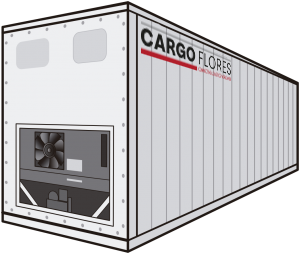 |
Refrigerated container (reefer container) | |||||
| Internal dimensions | Capacity and useful load | |||||
| Length | Width | Height | Volume | Maximum load | ||
| 20′ | 5.444 | 2.284 | 2.267 | 28,5 | 21.135/27.160# | |
| 40′ | 11.583 | 2.284 | 2.250 | 58,7 | 26.580 | |
| HC | 11.583 | 2.286 | 2.556 | 67,9 | 26.380 | |
| 45′ | 13.102 | 2.286 | 2.509 | 75,4 | 27.300 | |
A thermal container, built of aluminium or aluminium and stainless steel, able to keep the goods being transported at a temperature as low as –30 ºC. These have a self-contained refrigeration unit to allow the desired temperature to be maintained, which can be connected to the ship, transport vehicle, or terminal to obtain the power supply source that the unit needs to function. Some refrigerated containers also can control the humidity level in the interior. These are ideal for transporting perishable goods: meat, fruit, etc.
Open Top Container
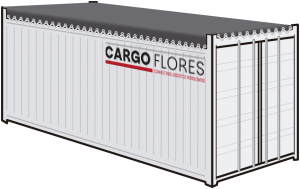 |
Open top containers | |||||
| Internal dimensions | Capacity and useful load | |||||
| Length | Width | Height | Volume | Maximum load | ||
| 20′ | 5.900 | 2.330 | 2.337 | 32,6 | 21.740 | |
| 40′ | 12.025 | 2.330 | 2.337 | 65,8 | 26.410 | |
A container that lacks a solid top, which allows cargo to be loaded using cranes. These can be covered with a flexible, removable cover, such as a reinforced plastic tarpaulin. A removable, rigid metal top can also be used. This container is made of steel and may have doors in the front or side panels. These are especially useful for large-sized cargo items such as sheets of glass or marble, construction materials, lumber, or high-volume machinery. These containers are made of steel.
Flat Rack Container
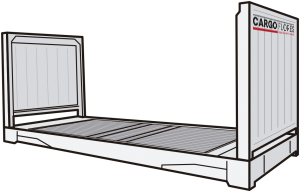 |
Flat rack container | |||||
| Internal dimensions | Capacity and useful load | |||||
| Length | Width | Height | Volume | Maximum load | ||
| 20′ | 5.628 | 2.178 | 2.159 | / | 21.740 | |
| 40′ | 11.762 | 2.178 | 1.986 | / | 26.410 | |
A container made from a platform without any other superstructure attached. This type is used when the characteristics of the elements being transported do not allow them to fit into any other type of container. They are especially suitable for heavy or high-volume elements, such as machinery, cables, storage drums, cable reels, steel sheets, heavy vehicles, or forest products. These containers are made of steel.
Open Side Container
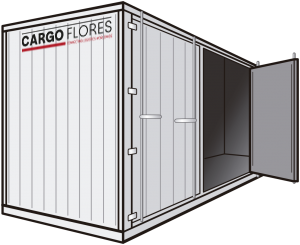 |
Open side container | |||||||
| Internal dimensions | Capacity and useful load | Doors open | ||||||
| Length | Width | Height | Vol. | Max. load | Width | Height | ||
| 20′ | 5.896 | 2.310 | 2.255 | 31 | 22.470 | 2.236 | 1.960 | |
When the goods that must be loaded are long and are difficult to handle using the end doors, a container open on one or both sides can be used to facilitate handling. These are especially suitable for loading and unloading at railway stations. These are made of steel.
Tank Container
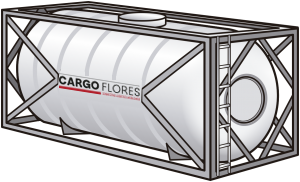 |
Tank container (ISO tank) | |||||
| Internal dimensions | Capacity and useful load | |||||
| Length | Width | Height | Volume | Maximum load | ||
| 20′ | / | / | / | 21 | 27.410 | |
This type is used to transport bulk liquids in general (oil, plastics, resins, latex, milk, beer, wine, mineral water, etc.), as well as certain hazardous substances such as toxic, corrosive, or highly flammable liquids. This type consists of an aluminium or stainless steel tank attached to a frame or support structure along with the necessary accessories (corner brackets, etc.) for securing them to the anchoring points on ships, trucks, or train cars, or else for being stacked on top of another container.
| Meaning of the first digit or the first two digits of the container’s serial number | |||||||||||
| General cargo container | Refrigerated container | Open top container | Open top container | ||||||||
| 20′ | 0 | 3 | 5 | 6 | 8 | 22 | 23 | 25 | 26 | 52 | 92 |
| 40′ | 1 | 4 | 7 | 20 | 21 | 24 | 27 | 54 | 94 | ||
| HC | 96 | 29 | / | / | |||||||
NB: Dimensions are expressed in millimetres (mm), capacities in cubic meters (m3), and weights in kilograms (kg). The red loading line on the interior of the container’s side wall indicates the maximum permissible load height.
CONTAINERS FOR AIR TRANSPORT
These containers are used for air cargo shipping, and their shapes are adapted to the fuselage of the aircraft. These are made of aluminium.
Container AKH
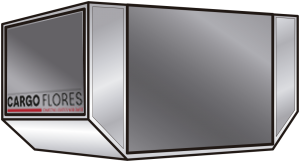 |
Container AKH | ||||
| Internal dimensions | Capacity and useful load | ||||
| Length | Width | Height | Volume | Max.Load | |
| 55.5″ | 96″ | 43″ | 120cu.ft | 2.499lbs | |
P1P Container
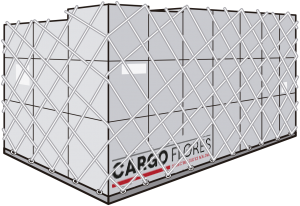 |
P1P | ||||
| Internal dimensions | Capacity and useful load | ||||
| Length | Width | Height | Volume | Maximum load | |
| 3.170 | 2.230 | 1.620 | 11,9 | 6.033 | |
P6P, flat pallet with net
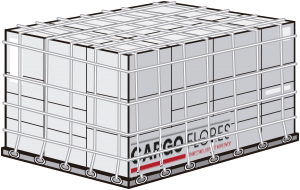 |
P6P, flat pallet with net | |||||
| Internal dimensions | Capacity and useful load | |||||
| Length | Width | Height | Volume | Maximum load | ||
| 10′ | 3.170 | 2.430 | 1.620 | 21,2 | 6.804 | |
PLA, half pallet with net
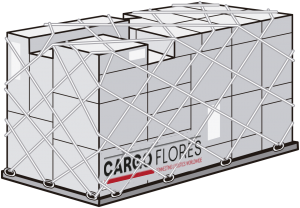 |
PLA, half pallet with net | ||||
| Internal dimensions | Capacity and useful load | ||||
| Length | Width | Height | Volume | Maximum load | |
| 3.170 | 1.530 | 1.620 | 7,2 | 3.175 | |
Para, half pallet with net
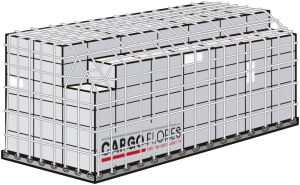 |
Para, flat pallet with net | |||||
| Internal dimensions | Capacity and useful load | |||||
| Length | Width | Height | Volume | Maximum load | ||
| 16′ | 4.970 | 2.430 | 2.430 | 26,8 | 11.300 | |
Flat pallet with net
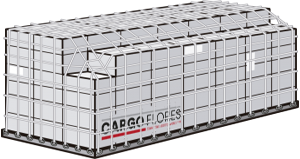 |
Flat pallet with net | |||||
| Internal dimensions | Capacity and useful load | |||||
| Length | Width | Height | Volume | Carga máxima | ||
| 20′ | 6.040 | 2.430 | 2.430 | 33,2 | 11.340 | |
PGA, flat pallet with net
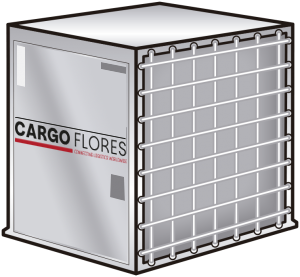 |
PGA, flat pallet with net | ||||
| Internal dimensions | Capacity and useful load | ||||
| Length | Width | Height | Volume | Maximum load | |
| 3.170 | 2.430 | 2.430 | 17,5 | 6.804 | |
AMD contoured container
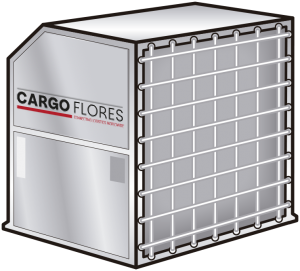 |
AMD contoured container | ||||
| Internal dimensions | Capacity and useful load | ||||
| Length | Width | Height | Volume | Maximum load | |
| 3.170 | 243 | 243 | 19,9 | 6.800 | |
AGA, box container
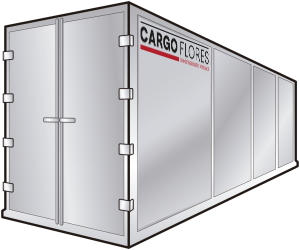 |
AGA, box container | |||||
| Internal dimensions | Capacity and useful load | |||||
| Length | Width | Height | Volume | Maximum load | ||
| 20′ | 6.040 | 2.430 | 2.430 | 33,0 | 11.340 | |
AAF container
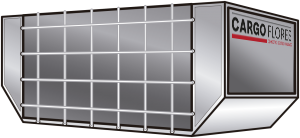 |
AAF | ||||
| Internal dimensions | Capacity and useful load | ||||
| Length | Width | Height | Volume | Maximum load | |
| 4.060 | 2.240 | 1.630 | / | 6.033 | |
AAU, contoured container
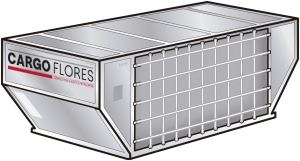 |
AAU, contoured container | ||||
| Internal dimensions | Capacity and useful load | ||||
| Length | Width | Height | Volume | Maximum load | |
| 4.720 | 2.240 | 1.620 | 14,2 | 6.033 | |






